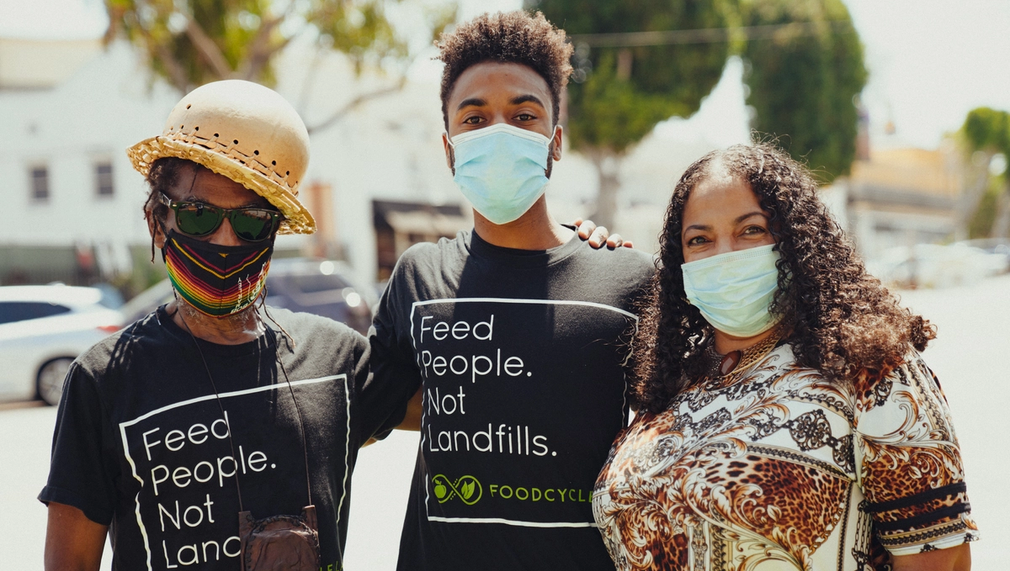FoodCycle - Feed People Not Landfills
We’re helping Angelenos lead the way to fighting food insecurity and climate change by connecting excess food from businesses with a network of hundreds of organizations serving hungry people throughout Los Angeles. FoodCycle is using the Careit app to empower people to volunteer and fight climate change and food insecurity by recovering food. We believe in the power of food to heal individuals and build community, as nonprofits, government and the private sector join forces to create a model for change.

What is the primary issue area that your application will impact?
Climate and Environment
In which areas of Los Angeles will you be directly working?
County of Los Angeles
City of Los Angeles
In what stage of innovation is this project, program, or initiative?
Expand existing project, program, or initiative
What is your understanding of the issue that you are seeking to address?
More than 40% of food in the US is wasted every year, it ends up in landfills, and becomes a major contributor to climate change. Meanwhile, 45 million people in the US lack access to healthy food. FoodCycle is working to solve both these problems - diverting food from landfills and using it to feed hungry people 1 in 5 Angelenos are estimated to be food insecure, with the highest rates in communities of color. FoodCycle collaborates with nonprofits to help them increase their impact, providing them with access to fresh food that would otherwise have been thrown away, helping eliminate food waste while helping community members live happier, healthier, and more secure lives. The connection between food waste and climate change inspired the state of CA and the city of LA to take the lead in creating new policies encouraging businesses to donate excess edible food. The new law SB 1383 provides a unique opportunity to build a network that supports the expected increase in donations.
Describe the project, program, or initiative this grant will support to address the issue.
This grant will allow FoodCycle to expand our efforts to reduce food waste and connect to communities experiencing food insecurity, ramping up our activities as donations increase in the wake of the passage of SB1383. This new law, which mandates that businesses throughout California donate excess food will lead to sharp uptick in donations, which grants funds will allow us to distribute to a growing network of community partners. Funds will be used to support four key activities: Promote access to food resources throughout the city by expanding our distribution program. This grant will enable us to collect donations from a larger number of donors as the amount of available food grows in response to the new legislation. Expand and support our network of nonprofits by providing them with healthy perishable food that would otherwise have gone to waste. This grant will enable us to deliver more food to more people, reducing food insecurity throughout the city of Los Angeles Increase outreach and education to businesses, informing them of the new requirement and how we can help them meet it by providing them with the free Careit app to encourage them to donate rather than discard edible food Publicize volunteer-based food recovery programs and expand use of the Careit app to empower community members to fight food insecurity and climate change. We’ll increase communications with journalists and continue to build our social media presence to expand our impact.
Describe how Los Angeles County will be different if your work is successful.
By utilizing the funds provided by the 2050 grant program, FoodCycle will make a major impact in the quality of life for individuals across the city of Los Angeles. Over the one year term of the grant period, our expanded food distribution network will be poised to collect a growing number of donations as SB1383 comes into effect. By working with an expansive network of community nonprofits, we’ll be providing increased access to healthy food to historically underserved communities, while reducing the impact of wasted food on climate change. Over the long term, we’ll reimagine the culture of food waste by making the donation process accessible to all, collaborating with businesses throughout the city. By taking advantage of this grant program to increase our impact, FoodCycle will enable Los Angeles to serve as a model for climate justice and food insecurity remediation driven by a partnership of government, businesses, and the non profit sector for communities throughout the US.
What evidence do you have that this project, program, or initiative is or will be successful, and how will you define and measure success?
FoodCycle measures impact in terms of meals served, lbs diverted from landfills and greenhouse gas emission reductions. We use the Careit app to track metrics on all food rescued, which provides us with real time data. We’re currently providing more than 60,000 meals per week to our network of community based organizations. Our proven model allowed us to expand rapidly in response to the increased food insecurity resulting from the pandemic. We worked with Hack for LA’s Food Oasis project to identify almost 1700 organizations serving food insecure populations throughout the city, collaborating with corporations like Trader Joes to identify those located in the identified “food deserts” of Los Angeles where access to healthy food was limited, even before the pandemic. During the past two years we prioritized directing more resources to those areas, growing our impact by 2013.49% since 2019. FoodCycle was recognized by the Environmental Protection Agency for achievements in 2021.
Approximately how many people will be impacted by this project, program, or initiative?
Direct Impact: 90,000
Indirect Impact: 360,000